| Cell Research: |
| Chem Biol Interact. 2010 Apr 15;185(1):18-24. | | Glycitein inhibits glioma cell invasion through down-regulation of MMP-3 and MMP-9 gene expression.[Pubmed: 20188714] | Matrix metalloproteinases (MMPs) are zinc-dependent endopeptidases that play a pivotal role in invasion and angiogenesis of malignant glioma cells. Therefore, the inhibition of MMPs has been suggested to be a promising therapeutic strategy for brain tumors.
METHODS AND RESULTS:
In the present study, we found that Glycitein, a bacterial metabolite of the isoflavone glycitin, inhibits the expression of MMP-3 and MMP-9 at promoter, mRNA, and protein levels in PMA-stimulated U87MG human astroglioma cells. In addition, gelatin zymography showed that Glycitein inhibited the PMA-induced MMP-9 secretion in U87MG cells. A subsequent Matrigel invasion assay revealed that Glycitein suppresses the in vitro invasiveness of glioma cells, which may be at least partly due to the Glycitein-mediated inhibition of MMP-3 and MMP-9. In support of this, treatment of MMP-3- or MMP-9-specific inhibitor significantly suppressed PMA-induced invasion of glioma cells. Further mechanistic studies revealed that Glycitein inhibits the DNA binding and transcriptional activities of NF-kappaB and AP-1, which are important transcription factors for MMP-3 or MMP-9 gene expression. Furthermore, Glycitein suppresses PMA-induced phosphorylation of three types of MAP kinases, which are upstream signaling molecules in MMP gene expressions and NF-kappaB and AP-1 activities in glioma cells.
CONCLUSIONS:
Therefore, the inhibition of MMP-3 and MMP-9 expression by Glycitein may have therapeutic potential for controlling invasiveness of malignant gliomas. | | J Nutr Biochem. 2007 Aug;18(8):525-32. | | Glycitein activates extracellular signal-regulated kinase via vascular endothelial growth factor receptor signaling in nontumorigenic (RWPE-1) prostate epithelial cells.[Pubmed: 17156992 ] | Increased consumption of soy is associated with a decreased risk for prostate cancer; however, the specific cellular mechanisms responsible for this anticancer activity are unknown. Dietary modulation of signaling cascades controlling cellular growth, proliferation and differentiation has emerged as a potential chemopreventive mechanism.
METHODS AND RESULTS:
The present study examined the effects of four soy isoflavones (genistein, daidzein, Glycitein and equol) on extracellularsignal-regulated kinase (ERK1/2) activity in a nontumorigenic prostate epithelial cell line (RWPE-1). All four isoflavones (10 micromol/L) significantly increased ERK1/2 activity in RWPE-1 cells, as determined by immunoblotting. Isoflavone-induced ERK1/2 activation was rapid and sustained for approximately 2 h posttreatment. Glycitein, the most potent activator of ERK1/2, decreased RWPE-1 cell proliferation by 40% (P<.01). Glycitein-induced ERK1/2 activation was dependent, in part, on tyrosine kinase activity associated with vascular endothelial growth factor receptor (VEGFR). The presence of both VEGFR1 and VEGFR2 in the RWPE-1 cell line was confirmed by immunocytochemistry. Treatment of RWPE-1 cells with VEGF(165) resulted in transient ERK1/2 activation and increased cellular proliferation.
CONCLUSIONS:
The ability of isoflavones to modulate ERK1/2 signaling cascade via VEGFR signaling in the prostate may be responsible, in part, for the anticancer activity of soy. |
|






 Cell. 2018 Jan 11;172(1-2):249-261.e12. doi: 10.1016/j.cell.2017.12.019.IF=36.216(2019)
Cell. 2018 Jan 11;172(1-2):249-261.e12. doi: 10.1016/j.cell.2017.12.019.IF=36.216(2019) Cell Metab. 2020 Mar 3;31(3):534-548.e5. doi: 10.1016/j.cmet.2020.01.002.IF=22.415(2019)
Cell Metab. 2020 Mar 3;31(3):534-548.e5. doi: 10.1016/j.cmet.2020.01.002.IF=22.415(2019) Mol Cell. 2017 Nov 16;68(4):673-685.e6. doi: 10.1016/j.molcel.2017.10.022.IF=14.548(2019)
Mol Cell. 2017 Nov 16;68(4):673-685.e6. doi: 10.1016/j.molcel.2017.10.022.IF=14.548(2019)